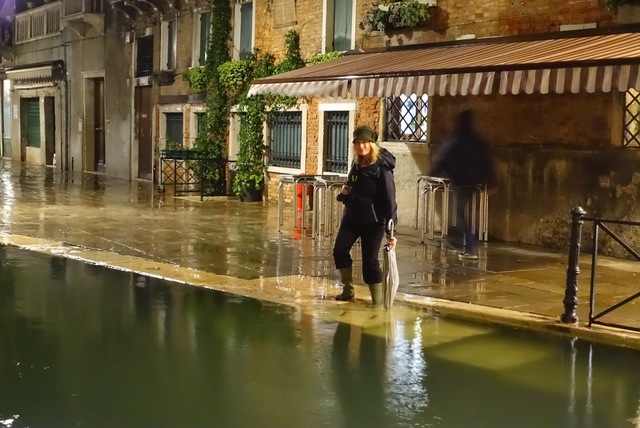If you buy land that will be covered by rising seas, should the government help you?

Evidence mounts that sea level rise can't be avoided now, absent some miracle of geoengineering, and maybe not even with that. Even if you're one of those who insists human pollution isn't the cause, the planet is getting warmer, the ice sheets are melting at extreme rates.
When it comes to sea level rise, it's simple to know who will be affected. We know the height of all the land. We don't know the date the seas will reach that level, and we don't know what level they will finally reach before we fix things, but as time passes, we will get better handles on that.
For the people living on low-lying land, there will be calls for the government to help them, at the expense of those on higher ground. There will be efforts to build levees. Houses will be raised on stilts. There will be emergency funds during floods, and eventual funds to help people move.
What if governments declare today that this is coming. That a deadline approaches. Pick your date, but imagine Jan 1, 2030, a date before serious rise will appear.
Anybody who bought their land after the deadline would no longer be eligible to receive government assistance for problems caused by global warming. Anybody who sold or leased land would have a duty to inform the buyer, in fact, you couldn't transfer title low-lying land without the buyer signing that they are aware of character of the land and the new rules.
If you live on in your home that you've had for a long time, we'll help you, to the extent we help anyone. If you inherit a family home in the lowlands, we'll help you. This is not a guarantee of help; rather it's a declaration of who won't be helped.
Of course, we will be hurting those people because the value of their land should drop. They may find themselves forced to stay on the land until it's inundated, just to get what help may come, if any comes. Their property values should drop anyway as sea levels rise, simply because assistance is not guaranteed regardless of this rule.
On the other hand, skeptics of global warming will have a chance to put their money where their mouth is, by buying up this land at discounted, but hopefully not too discounted, prices. They can take the risk, and if they are right, get valuable waterfront property for a discount.
This need not be a binary plan. It could involve various thresholds, like getting less assistance as time goes on. The dates could be adjusted based on new data on the trends in sea level rise.
It could also be applied to other factors, such as land subject to storm surge. Storm surge is caused by weather, but it depends on sea level, and weather events can become more common with climate change. Same for flooding. Mind you, I have never had a lot of sympathy for those who build or rebuild on flood plains in the first place.
This approach does not really work on very widespread effects, like changes to whole regions of agricultural land. And it's harder to apply it to weather effects, like greater flooding.
There could also be a special rule if it is decided to protect land with levees. A levee should generally be paid for by those whose land it protects, but in this case, there might be a tax to do so only on the recent buyers, with some break for the long-term owners. This might make it more practical to fund such a levee. ~








Comments
Ross
Thu, 2019-05-23 13:23
Permalink
A flood by any other name...
Coastal land affected by rising sea levels is just a small slice of the more general flooding problem we've been debating for decades. Climate change has brought ruinous flooding to places far from any ocean:
https://weather.com/storms/severe/news/2019-05-21-severe-thunderstorms-flash-flooding-plains-midwest-may-21-24
Coastal flooding will be classified as just that: flooding, becoming more frequent and severe until the waters never recede at all.
PBS ran an interesting series "Sinking Cities." I watched the New York and London episodes. I was impressed by the diversity of methods that can be employed for flood protection and mitigation. My greatest fear is the anti-science attitude of politicians will reduce our options and make addressing problems much more expensive than necessary, or even impossible.
Richard Hershberger
Fri, 2019-05-24 07:51
Permalink
FWIW, when I bought my house
FWIW, when I bought my house eleven years ago, potential for flooding influenced my decision of where to go. Sea level wasn't the issue, as I am well inland, but rather the local watercourses. A house by a creek can be a lovely setting, but even before climate change it meant that you had to expect flooding every few years. This is only going to get worse.
Add new comment